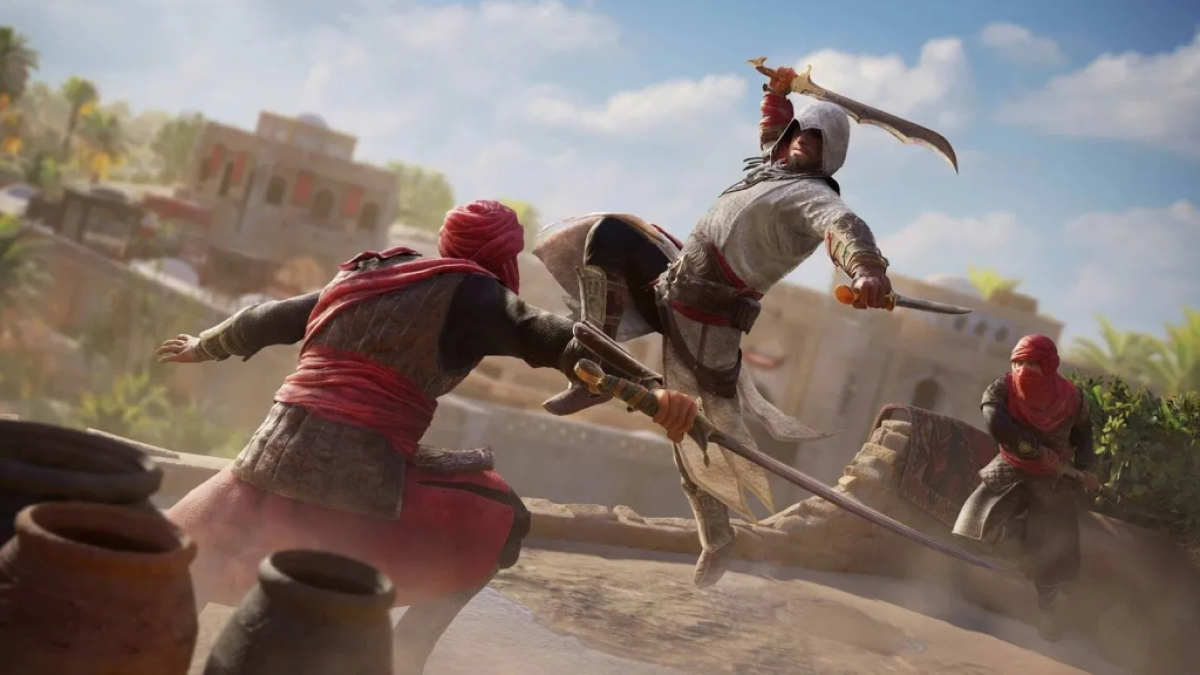Ubisoft’s Assassin’s Creed franchise has introduced multiple protagonists and time periods since the first installment hit shelves in 2007. It’s a lot to keep track of and begs the question: how do you play the Assassin’s Creed games in order?
The answer is far from simple – even if you stick to just the 13 core Assassin’s Creed entries (and trust us: you should). So, with this in mind, here’s a handy guide to the series’ real-world and in-universe order.
Related: Most Underrated Assassin’s Creed Games, Ranked
How to Play the Assassin’s Creed Games in Chronological Order

As we alluded to above, while there are 23 Assassin’s Creed games (not including remasters, iOS ports, and the like), only the 13 main titles are important to the franchise’s overarching narrative. And while stripping out extraneous spinoffs makes life a bit easier, the baker’s dozen action-adventure/stealth games we’re left with are still challenging.
All of these games – except for 2023’s Assassin’s Creed Mirage – consist of two components: a period central story and a modern-day framing sequence. As such, Assassin’s Creed technically has two correct chronological orders, depending on which narrative thread you follow.
Yet most fans agree that following the chronology of the modern-day sequences is the most satisfying way to experience the series’ wider narrative. This breaks down as follows:
- Assassin’s Creed (2007)
- Assassin’s Creed II (2009)
- Assassin’s Creed: Brotherhood (2010)
- Assassin’s Creed: Revelations (2011)
- Assassin’s Creed III (2012)
- Assassin’s Creed IV: Black Flag (2013)
- Assassin’s Creed Rogue (2014)
- Assassin’s Creed Unity (2014)
- Assassin’s Creed Syndicate (2015)
- Assassin’s Creed Origins (2017)
- Assassin’s Creed Odyssey (2018)
- Assassin’s Creed Valhalla (2020)
- Assassin’s Creed Mirage (2023)
That said, if you still want to play through the Assassin’s Creed games based on their historical settings, here’s how to do it:
- Assassin’s Creed Odyssey (2018)
- Assassin’s Creed Origins (2017)
- Assassin’s Creed Mirage (2023)
- Assassin’s Creed Valhalla (2020)
- Assassin’s Creed (2007)
- Assassin’s Creed II (2009)
- Assassin’s Creed: Brotherhood (2010)
- Assassin’s Creed: Revelations (2011)
- Assassin’s Creed IV: Black Flag (2013)
- Assassin’s Creed Rogue (2014)
- Assassin’s Creed III (2012)
- Assassin’s Creed Unity (2014)
- Assassin’s Creed Syndicate (2015)
One final wrinkle applies to both chronological orders: The Tyranny of King Washington. A DLC expansion pack, The Tyranny of King Washington takes place in an alternate version of Assassin’s Creed III‘s Revolutionary War timeline. Although this stuff isn’t technically canon, the bookend cutscenes are set in the franchise’s core reality.
Related: What Assassin’s Creed Game Should You Play First?
How to Play the Assassin’s Creed Games in Release Order

That’s the in-universe chronology covered – what about if you want to play Assassin’s Creed in release order? That’s a lot easier: follow the present-day playthrough order listed above.
You can even break the franchise into different eras if that seems daunting. As each of Assassin’s Creed‘s present-day protagonists has a self-contained story arc, each of their debut games is a perfect jumping-off point.
The era approach works as follows:
Desmond Miles era
- Assassin’s Creed (2007)
- Assassin’s Creed II (2009)
- Assassin’s Creed: Brotherhood (2010)
- Assassin’s Creed: Revelations (2011)
- Assassin’s Creed III (2012)
“Noob” era
- Assassin’s Creed IV: Black Flag (2013)
“Numbskull” era
- Assassin’s Creed Rogue (2014)
“The Initiate” era
- Assassin’s Creed Unity (2014)
- Assassin’s Creed Syndicate (2015)
Layla Hassan / Basim Ibn Ishaq era
- Assassin’s Creed Origins (2017)
- Assassin’s Creed Odyssey (2018)
- Assassin’s Creed Valhalla (2020)
- Assassin’s Creed Mirage (2023)
And that’s how to play the Assassin’s Creed games in order.
The Assassin’s Creed games are available for purchase through Ubisoft.






Published: Feb 2, 2024 10:53 am